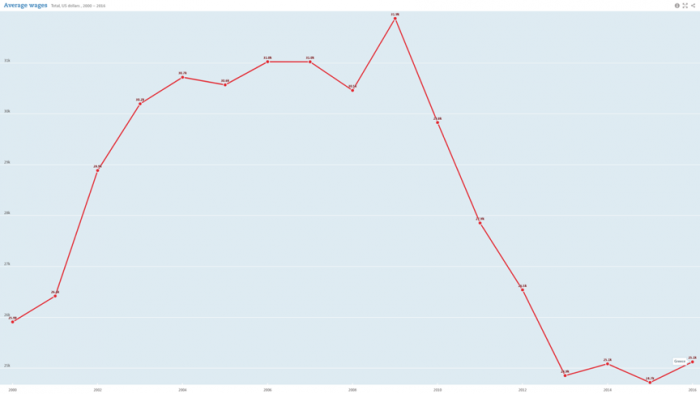By Leonidas Vatikiotis
19.01.2018
The main question that prevailed in Greece till 2015, before the years of cynicism which started along with the rise of SYRIZA and the nationalistic right party of Independent Greeks in power, was whether the adjustment programs had succeeded or not.
The “denials” characterized them as inefficient and aimless, judging their effectiveness by the achievement of their nominal aims; Looking for example at the size of the public debt, the Greek rescue should be teached in student amphitheatres as an epic failure. Greek sovereign debt was 115% of GDP before the rescuers landed on Greek soil in May 2010 and now, a few months before the third program ends in August 2018, it has reached 181% of GDP.[1] In the preliminary report of Truth Committee on Public Debt (which was formed in the Greek Parliament in April 2015 and audited the sovereign debt and concluded that it must not be paid) we concluded that the priority of rescuing the private creditors and the neoliberal reforms had a negative effect on the debt sustainability.
Almost the same recipe is repeated in every program, by all the different governments and political parties which have undertaken the responsibility of this open-ended shock therapy since 2010. If it was a wrong direction, why didn’t they correct the route? Even the IMF has officially recognized the fallacies of this strategy.[i]
Simultaneously, the Greek economic and political elite (through the industrialists’ or the bankers’ union) never expressed objections or hesitations to the conditionalities which accompanied every Memorandum of Understanding (the agreements with the creditors) and the guidance of the midterm evaluations. It’s very characteristic that the conditionalities which have been agreed will remain many decades after the official end of the current program. For example: the primary budget surpluses will be held until 2060 and the Greek Privatisation and Investment Fund which have the aim to gather 50 bn. euros from privatisations will remain active for 98 more years.
If we want to check the success of the programs of economic adjustment we must turn our attention to the transformations they brought to the labour law and labour relations. What happened in Greece can be compared only to what happened in Eastern and Central Europe during the transition from the so-called existent socialism to the capitalism. In real terms, the political boundaries of “Eastern Europe”, countries in which the post-war achievements of the working-class movement have declined, have reached the Mediterranean Sea.
[1] According to the data of the budget for 2018, which were published in December 2017.
[i] The IMF and the Crisis in Greece, Ireland and Portugal, Independent Evaluation Office of the International Monetary Fund, 2016. http://www.ieo-imf.org/ieo/fil…
Absolute reduction of wages
The most obvious answer to the fundamental question about the success of the terms of the loan agreement is presented in the evolution of the wages. According to OECD, the 2016 annual average wage (25,124 US dollars) was lower than the 2000 wage (25,909 USD). Greek working class has thus returned to the 20th century under the rule of the creditors! Knowing that all these years the wage and social inequality has increased sharply we can suppose, with no risk, that the social situation of the lower income group is much worse because the averages have become less representative. In the age of the extremes the averages are misleading.
The unprecedented reduction of real wages is depicted even in the Eurostat figures, where it is apparent that labour cost per hour in euros was reduced from 16.7 in 2008 to 14.2 in 2016.[i] In only one other country, Cyprus, the wages were reduced during the years of the Memoranda: from 16.7 euros in 2008 to 15.8 in 2016, but even there the reduction (-5.4%) was much lower than the Greek one (-15%). During the same years the wages steadily increasing in the EU and the Euro area from 21.5 to 25.4 and from 25.3 to 29.8, respectively.
Of course, someone could respond that in a sinking economy there is nothing more predictable than decreased incomes. Yes, but in this case, there is a difference: the wages did not decrease just because of the sinking economy, but because the laws where changed. In other words, the wage share was reduced in a greater rate than in comparison to the national product. The wage share as percentage of GDP was reduced from 61.1% in 2010 to 56.7% in 2015.[ii] And the unemployment reached 27% of the labour force, the highest level in the EU. In other words, the crisis didn’t lead to a symmetrical reduction of salaries and earnings. The crisis, and more specifically the conditionalities of the rescue loans, altered the balance between the working class and the ruling class, deteriorating the position of the first.
This well synchronized squeeze wasn’t the result of a spontaneous reaction of the bosses. The second Memorandum which was signed in February 2012 by the appointed government of technocrats and the creditors, as a strict precondition for the restructuring of the sovereign debt, included (among many others) the reduction of basic salaries by 22% and for the youth under 25 years by 32%. In the same law, there are two articles which abolish the collective bargaining system between the government, employers’ associations and trade unions and prohibits any kind of wage increase until the unemployment rate reaches 10 % (20.5% in September of 2017). Between 2010 and 2012, other conditionalities had imposed the abolition of the 13th (one salary during Christmas), of the 14th (half a salary in Easter and half more in holidays) salary and of many extra bonuses which were given by the employers.
[i] Hourly labour costs ranged from €4.4 to €42.0 across the EU Member States in 2016. Eurostat news release, 58/2017, 6 April 2017.
[ii] Statistical Annex of European Economy, European Commission, Economic and Financial Affairs, Spring 2017. Wage costs. Adjusted wage share; total economy; as percentage of GDP at current factor cost, page 72.

With voluntary payment, exploitation haven!
These official cuts gave a push to employers to implement a working regime that reminds of medieval years. The most striking: Even now, when the official data show a return to positive rates of growth, 1 in every 3 employees is not paid regularly; either he is not paid by no means, he is paid with a delay of a few months, or he is receiving a part of his wage and taking a promise for the remaining part. There are super market enterprises which are paying their personnel by coupons, necessitating them to return the salary, spending it into the firm.
The systematic and continuous degradation of the wage labour has appeared even in the figures of the relevant Ministry. Concretely, in September 2017, and when in the power there was a party which wanted to be called left-wing, there were 126.956 employees with a salary of under 100 euros, which means that they are being paid 5 euros a day when the cheapest cinema costs 7 euros, the cheapest theatre 15 and an espresso more than 2 euros.
Another form of deregulation of labour laws that adjustment programs brought is the undeclared work. According to ILO, from a share of 29.7% in 2010 it reached 40.5% of the labour force at the end of 2013, showing that the brutal neoliberal reforms were going hand by hand with the absolute deregulation of labour. Since then one minister after the other, along with the Troika, has declared war to undeclared work. It’s a war which remains in the documents and never takes a substantial, real form. The underlying problem is the permanent lack of personnel and resources in the state agencies that have the responsibility to check the laws.
The fact that the Memoranda were a turning point for the history of exploitation in Greece has also appeared in official figures were every kind of precarious job (part time, seasonal and temporary) has every month, quarter or year a larger share than the permanent jobs. That means that the majority of the hiring is flexible and under-paid, identical to working poverty!
They will prohibit the strikes!
Contrary to the climate of high expectations that the government is cultivating, the future is much gloomier. The IMF has requested, and the PM Alexis Tsipras accepted in a letter to IMF Managing Director Christine Lagarde, dated in July of 2017, to change the terms for workers’ strike. As a result, and as a precondition for the closure of the current evaluation, the majority of the Greek parliament will vote that a sine qua non precondition for announcing a strike by a trade union will be the accordance of the absolute majority of its members. Everyone can imagine what would happen if this rule was applied in the elections for the European Parliament, where less and less people are voting and the last elections turnout was just 42.61%.[i] In addition, everyone can imagine what would happen in every parliament if this rule had been adopted: no laws would be voted! However, IMF and EU organize these democracy contests at the expense of the working class.
Instead of conclusion: Everyone knew what the IMF conditionalities meant for labour rights, but the experience revealed the EU to be even more aggressive than the IMF, often representing genuinely the interests of the Greek economic elite.











